
Our reviewers on the best (mostly Australian) books they've pulled from the shelf in the past few months.
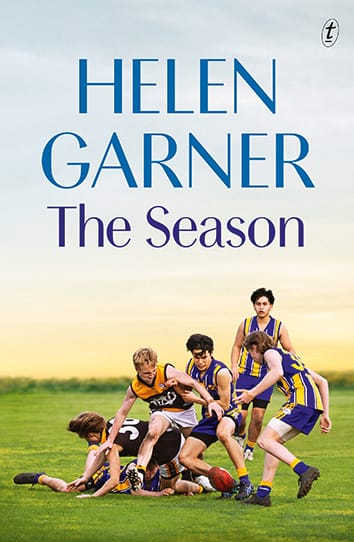
Reviewed by Jaclyn Crupi
Following as a natural progression from her recently published diaries in three volumes, The Season shows Garner desperate to bond with her youngest grandchild. He’s a boy on the cusp of manhood playing under-16s footy.
His grandmother decides to embed herself in the team as a way of staying close to him. Her initial intention of being a silent witness to team machinations is soon thwarted by her delight at handing out orange slices at half-time and cheering them on.
As much as this book is about the nature of team sports and the reasons footy can be so thrilling, it’s about family life and the desire to connect with the ones we love. The thrilling conclusion sees us barracking for a team as well as for a family.
Garner is vulnerable throughout the book, expressing self-doubt as a writer despite her success and accolades. Her wit and warmth permeate the book deeply. Don’t be surprised if you end up caring about football in a way you never have before, such is the power generated when Garner turns her attention to a subject.
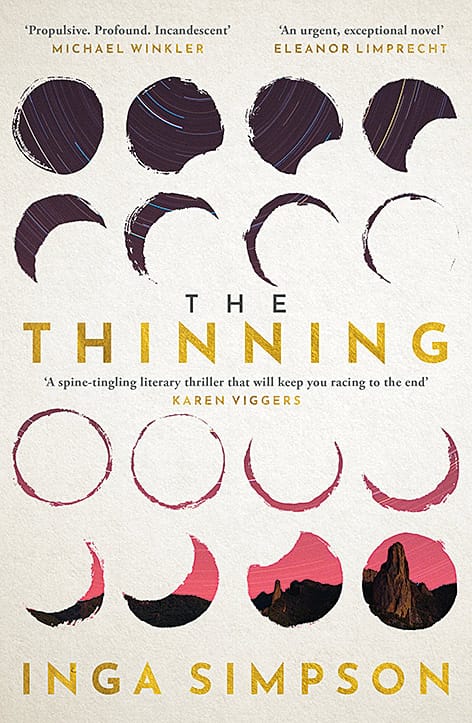
Reviewed by Lucy Munro
“We haven’t always lived on amber alert, ready to run,” reflects Fin Kelvin, the teen narrator of Inga Simpson’s eco-thriller.
The daughter of an astronomer and astrophotographer, Fin grew up studying the skies at the Siding Spring Observatory near Coonabarabran in north-west New South Wales. But the magic of her childhood is being ravaged by environmental collapse – the Great Barrier Reef is extinct; the darkness of the night sky is being swallowed by satellites; and the cycles of the moon are being disrupted by a space-mining catastrophe.
With her mother and friends, Fin is living off the grid, in hiding from a government intent on further destruction. The suspense builds as a solar eclipse looms and, with it, a chance for Fin to save the natural world and all she loves from destruction.
In lyrical prose, Simpson demonstrates her mastery as a nature writer. Her vivid descriptions ebb and flow like cool water as Fin gallops across landscapes from Warrumbungle National Park to the Pilliga. A good one for young adult
readers.
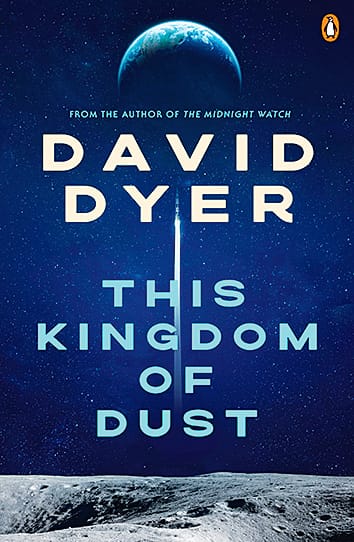
Reviewed by Lucy Munro
“The landing was imminent, and soon the spacecraft would enter the ‘dead man’s zone’ – that phase of the descent in which it would be too late to abort. From that point on, the craft must either land or crash, and the woman watched by Aquarius must become either wife to a hero, or a widow.”
The 1969 televised moon landing of the Apollo 11 was one of humankind’s greatest moments in history. But what would have happened had the spacecraft never made it back to Earth? This is the premise explored in David Dyer’s latest novel. The story is told through the eyes of three characters: astronaut Buzz Aldrin, lost in space and grappling with his mortality; his wife Joan, also grappling not only with her husband’s possible demise but also the social restrictions placed on American women in the 1960s; and Aquarius, a conflicted journalist covering the crisis.
Dyer skilfully blends fact, fiction and science to create a work that reframes the moon landing as a tale of triumph shadowed by despair and examines the personal and collective costs of humanity’s ambitions. Totally compelling.
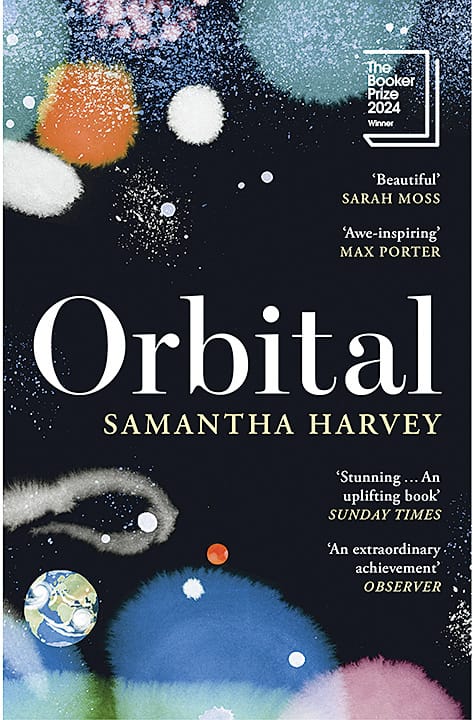
Reviewed by Jaclyn Crupi
In just 144 pages, it’s quite a remarkable feat for a book to leave a reader feeling their own cosmic insignificance while also reeling at the wonders of being alive on this beautiful planet. Last year’s Booker Prize winner reminds us that we are but a speck on a speck on a speck, and yet there is so much beauty to behold on Earth and in our shared humanity.
The scope of this novella is panoramic as six astronauts on the International Space Station orbit Earth in the course of a single day, each chapter aligned with an orbit, 16 in total. It’s these observations that drive the narrative rather than any form of plot.
This is a book about paying attention, about the act of noticing. The prose is stunning; prepare for one beautiful sentence after the next after the next. It’s a hopeful meditation, a love letter to our planet, that looks closely at the very ordinary and the truly spectacular.
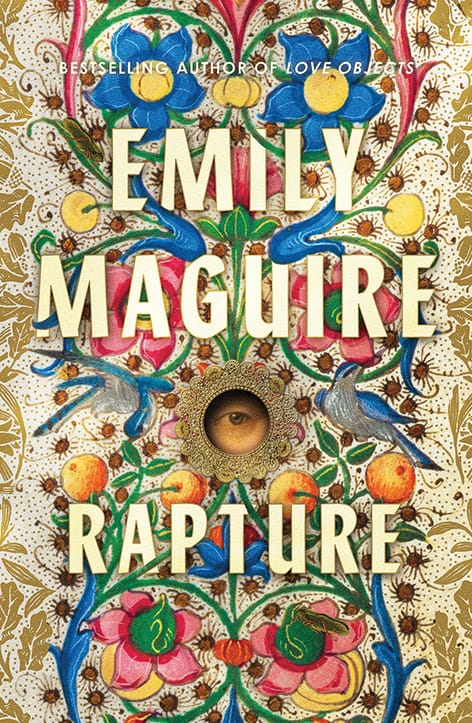
Reviewed by Jaclyn Crupi
A sensual, feminist and gritty imagining of the secret life (or more likely the double life) of Pope Joan is not something I expected to read from an Australian author, but here we have exactly that and I could not be happier.
Maguire is known for her contemporary fiction exploring patriarchy, family violence and identity. This is her first historical novel and I hope it’s not her last.
She conjures the legendary story of Agnes, the brilliant, motherless daughter of an English priest, forbidden from scholarly pursuits, yet who ascends the church hierarchy to unimaginable heights.
She hides her gender and suppresses her desires and, miraculously, becomes the Pope. Yet her hunger to be truly seen and to express her sensual life are irresistible forces in opposition to her piety. Just one man knows Agnes’s secret: ultimately both her protector and the source of her potential downfall.
This is not a dense historical novel; Maguire wears her research lightly. Intriguing at every turn.
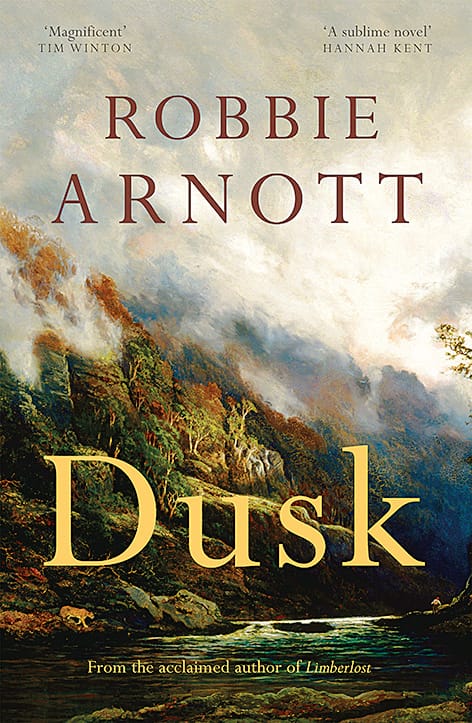
Reviewed by Helen Anderson
In the rich tradition of gothic noir in Australian literature, there’s no shortage of things Out There that must be hunted and vanquished: bushrangers, crocodiles, sharks, empty waterholes, psychotic serial killers. In Tasmanian author Robbie Arnott’s fourth novel, the predator is a black puma named Dusk, stalking sheep and shepherds in (we assume) colonial times in the Tasmanian highlands.
Chief among the big cat’s bounty hunters is a pair of young outcasts: twins Iris and Floyd. The fugitive children of escaped “killer-thieves”, they are as much prey as predators in what passes as society in these cursed badlands. It’s the twins’ tender, iron-cast commitment to each other and their shared quest for “rough freedom” that animates the story. That and Arnott’s heartfelt evocation of the highlands seen largely through Iris’s eyes: “Instead of harshness or bleakness she felt a freeing, lung-emptying openness that bounced off the hard stone, that waved through the thick mounds of tufted grass, threaded through the gnarled trees, fell down the chalking textures of the small tors that she and Floyd rode below.”